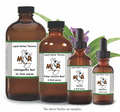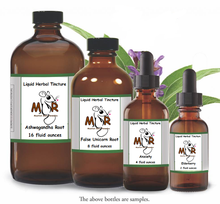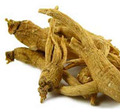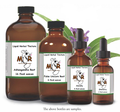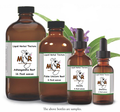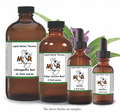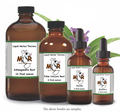 Loading... Please wait...
Loading... Please wait...- Home
- Herbal Tinctures
- Herbal Tinctures - Single Herbs
- Ginseng (Panax)Root Tincture
Ginseng (Panax)Root Tincture
Product Description
Ginseng Root Tincture
Also Known As - Panax ginseng
Origin - USA
Overview - Panax ginseng is a plant that grows in Korea, northeastern China, and far eastern Siberia. People use the root to make medicine. Do not confuse Panax ginseng with American ginseng, Siberian ginseng, or Panax pseudoginseng. See the separate listings for American Ginseng, Ashwaganda, Blue Cohosh, Canaigre, Codonopsis, Panax Pseudoginseng, and Siberian Ginseng.
Our tinctures are made with love and in small batches. We use Certified Grain Organic Alcohol and only use fresh and organically grown or wild-harvested herbs cultivated without the use of pesticides, fertilized with organic manure from our own chickens, rabbits and little kinder goats, and the water used is from our private well which is sustained by the Nisqually River. Our tinctures are "extra strength" not like the watered down and dull products found on the commercial marked today. While sampling a good portion our competitor’s products we found that the majority of them use more distilled water than alcohol, and the herbs they use are probably not picked fresh during harvest - which ultimately means there's less of the good stuff. We think you'll notice a difference with our tinctures.
All of our products are Non-GMO, gluten-free, natural and organic. Never fumigated or irradiated.
Medicinal Uses - Panax ginseng is taken by mouth to improve thinking, concentration, memory,Alzheimer's disease, work efficiency, physical stamina, preventing muscle damage from exercise, and athletic endurance.
Some people use Panax ginseng to help them cope with stress and as a general tonic for improving well-being. They sometimes call Panax ginseng an "adaptogen" when it's used in this way.
Panax ginseng is also used for depression, anxiety, general fatigue and chronic fatigue syndrome (CFS), multiple sclerosis, for boosting the immune system, and for fighting particular infections in a lung disease called cystic fibrosis. These infections are caused by a bacterium named Pseudomonas.
Some people use Panax ginseng to treat breast cancer and prevent ovarian cancer,liver cancer, lung cancer, and skin cancer.
Other uses include treatment of anemia, chronic bronchitis, swine flu, prediabetes and diabetes, inflammation of the stomach lining (gastritis), fever, hangover, chronic obstructive pulmonary disease (COPD), HIV/AIDS, fertility problems and sexual dysfunction in men, to increase sexual arousal in women, and asthma.
Panax ginseng is also used for bleeding disorders, loss of appetite, vomiting, intestinal problems, gallstones, bad breath, fibromyalgia, sleeping problems (insomnia), nerve pain, joint pain, dizziness, headache, hearing loss, convulsions, disorders of pregnancy and childbirth, hot flashes due to menopause, common cold and flu, heart failure, high blood pressure, quality of life, wrinkled skin, and to slow the aging process.
Some men apply Panax ginseng to the skin of the penis as part of a multi-ingredient product for treating early orgasm (premature ejaculation).
In manufacturing, Panax ginseng is used to make soaps, cosmetics, and as a flavoring in beverages.
Evidence:
- Alzheimer's disease. Evidence shows that taking Panax ginseng root daily for 12 weeks can improve mental performance in people with Alzheimer's disease.
- Lung disease called chronic obstructive pulmonary disease (COPD). Taking Panax ginseng by mouth seems to improve lung function and some symptoms of COPD.
- Mental function. Taking Panax ginseng by mouth might improve abstract thinking, mental arithmetic skills, and reaction times in healthy, middle-aged people but not in young adults. Panax ginseng alone does not seem to improve memory. But there is some evidence that a combination of Panax ginseng and ginkgo leaf extract can improve memory in otherwise healthy people between the ages of 38 and 66.
- Erectile dysfunction (ED). Taking Panax ginseng by mouth seems to improve sexual function in men with erectile dysfunction.
- Flu. Taking a specific Panax ginseng by mouth appears to reduce the risk of getting a cold or the flu. But, taking Panax ginseng does not seem to reduce flu symptoms or the length of the illness.
- Multiple sclerosis-related fatigue. Taking Panax ginseng daily for 3 months reduces feelings of tiredness and improves quality of life in females with MS.
- Premature ejaculation. Applying a cream containing Panax ginseng, angelica root, Cistanches deserticola, Zanthoxyl species, torlidis seed, clover flower, asiasari root, cinnamon bark, and toad venom (SS Cream) to the penis one hour before intercourse and washing off immediately before intercourse seems to help prevent premature ejaculation.
- Sexual arousal. Taking powdered Korean red ginseng, a specific form of Panax ginseng, seems to improve sexual arousal and satisfaction in postmenopausal women. Also, using a specific product containing Korean red ginseng and other ingredients (ArginMax for Women, Daily Wellness Company) seems to improve sexual desire in women who report sexual problems.
How does it work?
Panax ginseng contains many active substances. The substances thought to be most important are called ginsenosides or panaxosides. Ginsenosides is the term coined by Asian researchers, and the term panaxosides was chosen by early Russian researchers.
Panax ginseng is often referred to as a general well-being medication, because it affects many different systems of the body.
Parts Used - The root is the plant portion used medicinally. It can be found powdered in capsules, as tea or combined in formulas.
Precautions - Panax ginseng is POSSIBLY SAFE when applied to the skin as part of a multi-ingredient product (SS Cream), in the short-term.
Panax ginseng is POSSIBLY UNSAFE when taken by mouth, long-term (more than 6 months). Researchers think it may have some hormone-like effects that could be harmful with prolonged use.
The most common side effect is trouble sleeping (insomnia). Less commonly, people experience menstrual problems, breast pain, increased heart rate, high or low blood pressure, headache, loss of appetite, diarrhea, itching, rash, dizziness, mood changes, vaginal bleeding, and other side effects.
Uncommon side effects that have been reported include severe rash called Stevens-Johnson syndrome, liver damage, and severe allergic reactions.
Special Precautions & Warnings:
Pregnancy and breast-feeding: Panax ginseng is POSSIBLY UNSAFE when taking by mouth during pregnancy. One of the chemicals in Panax ginseng has been found to cause birth defects in animals. Do not use Panax ginseng if you are pregnant.
Not enough is known about the safety of Panax ginseng during breast-feeding. Stay on the safe side and avoid use.
Infants and children: Panax ginseng is LIKELY UNSAFE in infants and children. Using Panax ginseng in babies has been linked to poisoning that can be fatal. The safety of Panax ginseng in older children is not known. Until more is known, do not use Panax ginseng even in older children.
"Auto-immune diseases" such as multiple sclerosis (MS), lupus (systemic lupus erythematosus, SLE), rheumatoid arthritis (RA), or other conditions: Panax ginseng seems to increase the activity of the immune system. It might make auto-immune diseases worse. Don't use Panax ginseng if you have any auto-immune condition.
Bleeding conditions: Panax ginseng seems to interfere with blood clotting. Don't use Panax ginseng if you have a bleeding condition.
Heart conditions: Panax ginseng can affect heart rhythm and blood pressure slightly on the first day it is used. However, there are usually no changes with continued use. Nevertheless, Panax ginseng has not been studied in people with cardiovascular disease. Use Panax ginseng with caution if you have heart disease.
Diabetes: Panax ginseng might lower blood sugar. In people with diabetes who are taking medications to lower blood sugar, adding Panax ginseng might lower blood sugar too much. Monitor your blood sugar closely if you have diabetes and use Panax ginseng.
Hormone-sensitive conditions such as breast cancer, uterine cancer, ovarian cancer, endometriosis, or uterine fibroids: Panax ginseng contains chemicals (ginsenosides) that can act like estrogen. If you have any condition that might be made worse by exposure to estrogen, don't use Panax ginseng.
Trouble sleeping (insomnia): High doses of Panax ginseng have been linked with insomnia. If you have trouble sleeping, use Panax ginseng with caution.
Organ transplant: Panax ginseng might make the immune system more active. This could interfere with the effectiveness of medications that are given after an organ transplant to reduce the chance that the organ will be rejected. If you have received an organ transplant, don't use Panax ginseng.
Schizophrenia (a mental disorder): High doses of Panax ginseng have been linked with sleep problems and agitation in people with schizophrenia. Be careful when using Panax ginseng if you have schizophrenia.
Organ transplant: Panax ginseng might make the immune system more active. This could interfere with the effectiveness of medications that are given after an organ transplant to reduce the chance that the organ will be rejected. If you have received an organ transplant, don't use Panax ginseng.
Interactions:
- Alcohol interacts with GINSENG, PANAX
The body breaks down alcohol to get rid of it. Taking Panax ginseng might increase how fast your body gets rid of alcohol.
- Caffeine interacts with GINSENG, PANAX
Caffeine can speed up the nervous system. By speeding up the nervous system, caffeine can make you feel jittery and speed up your heartbeat. Panax ginseng might also speed up the nervous system. Taking Panax ginseng along with caffeine might cause serious problems including increased heart rate and high blood pressure. Avoid taking caffeine along with Panax ginseng.
- Furosemide (Lasix) interacts with GINSENG, PANAX
Some scientists think that Panax ginseng might decrease how well furosemide (Lasix) works. But there isn't enough information to know if this is a big concern.
- Insulin interacts with GINSENG, PANAX
Panax ginseng might decrease blood sugar. Insulin is also used to decrease blood sugar. Taking Panax ginseng along with insulin might cause your blood sugar to be too low. Monitor your blood sugar closely. The dose of your insulin might need to be changed.
- Medications changed by the liver (Cytochrome P450 2D6 (CYP2D6) substrates) interacts with GINSENG, PANAX
Some medications are changed and broken down by the liver. Panax ginseng might decrease how quickly the liver breaks down some medications. Taking Panax ginseng along with some medications that are changed by the liver can increase the effects and side effects of your medication. Before taking Panax ginseng talk to your healthcare provider if you take any medications that are changed by the liver.
Some medications that are changed by the liver include amitriptyline (Elavil), clozapine (Clozaril), codeine, desipramine (Norpramin), donepezil (Aricept), fentanyl (Duragesic), flecainide (Tambocor), fluoxetine (Prozac), meperidine (Demerol), methadone (Dolophine), metoprolol (Lopressor, Toprol XL), olanzapine (Zyprexa), ondansetron (Zofran), tramadol (Ultram), trazodone (Desyrel), and others. - Medications for depression (MAOIs) interacts with GINSENG, PANAX
Panax ginseng might stimulate the body. Some medications used for depression can also stimulate the body. Taking Panax ginseng with these medications used for depression might cause too much stimulation. This might cause side effects such as anxiousness, headache, restlessness, and insomnia.
Some of these medications used for depression include phenelzine (Nardil), tranylcypromine (Parnate), and others. - Medications for diabetes (Antidiabetes drugs) interacts with GINSENG, PANAX
Panax ginseng might decrease blood sugar. Diabetes medications are also used to lower blood sugar. Taking Panax ginseng along with diabetes medications might cause your blood sugar to go too low. Monitor your blood sugar closely. The dose of your diabetes medication might need to be changed.
Some medications used for diabetes include glimepiride (Amaryl), glyburide (DiaBeta, Glynase PresTab, Micronase), insulin, pioglitazone (Actos), rosiglitazone (Avandia), chlorpropamide (Diabinese), glipizide (Glucotrol), tolbutamide (Orinase), and others. - Medications that decrease the immune system (Immunosuppressants) interacts with GINSENG, PANAX
Panax ginseng increases the immune system. By increasing the immune system, Panax ginseng might decrease the effectiveness of medications that decrease the immune system.
Some medications that decrease the immune system include azathioprine (Imuran), basiliximab (Simulect), cyclosporine (Neoral, Sandimmune), daclizumab (Zenapax), muromonab-CD3 (OKT3, Orthoclone OKT3), mycophenolate (CellCept), tacrolimus (FK506, Prograf), sirolimus (Rapamune), prednisone (Deltasone, Orasone), corticosteroids (glucocorticoids), and others. - Medications that slow blood clotting (Anticoagulant / Antiplatelet drugs) interacts with GINSENG, PANAX
Panax ginseng might slow blood clotting. Taking Panax ginseng along with medications that also slow clotting might increase the chances of bruising and bleeding.
Some medications that slow blood clotting include aspirin, clopidogrel (Plavix), diclofenac (Voltaren, Cataflam, others), ibuprofen (Advil, Motrin, others), naproxen (Anaprox, Naprosyn, others), dalteparin (Fragmin), enoxaparin (Lovenox), heparin, warfarin (Coumadin), and others. - Stimulant drugs interacts with GINSENG, PANAX
Stimulant drugs speed up the nervous system. By speeding up the nervous system, stimulant medications can make you feel jittery and speed up your heartbeat. Panax ginseng might also speed up the nervous system. Taking Panax ginseng along with stimulant drugs might cause serious problems including increased heart rate and high blood pressure. Avoid taking stimulant drugs along with Panax ginseng.
Some stimulant drugs include diethylpropion (Tenuate), epinephrine, phentermine (Ionamin), pseudoephedrine (Sudafed), and many others. - Warfarin (Coumadin) interacts with GINSENG, PANAX
Warfarin (Coumadin) is used to slow blood clotting. There is some concern that Panax ginseng might decrease the effectiveness of warfarin (Coumadin). But it's not clear if this interaction is a big problem. Be sure to have your blood checked regularly. The dose of your warfarin (Coumadin) might need to be changed.
Suggested - Drops are taken by mouth, usually mixed with a small amount of water or added to tea, and each has unique properties and flavor. Some may be used topically as well. For mental improvement, daily doses of 200 to 400 mg taken for 12 weeks seem to be effective. For other reasons, 100 to 200 mg taken daily is commonly prescribed. Alternatively, a tincture can be taken in a dosage of 1 to 2 ml per day.
Conditions of Use and Important Information: This information is meant to supplement, not replace advice from your doctor or healthcare provider and is not meant to cover all possible uses, precautions, interactions or adverse effects. This information may not fit your specific health circumstances. Never delay or disregard seeking professional medical advice from your doctor or other qualified health care provider because of something you have read on Mountain Maus Remedies. You should always speak with your doctor or health care professional before you start, stop, or change any prescribed part of your health care plan or treatment and to determine what course of therapy is right for you.
This copyrighted material is provided by Natural Medicines Comprehensive Database Consumer Version. Information from this source is evidence-based and objective, and without commercial influence. For professional medical information on natural medicines, see Natural Medicines Comprehensive Database Professional Version. © Therapeutic Research Faculty 2009.








